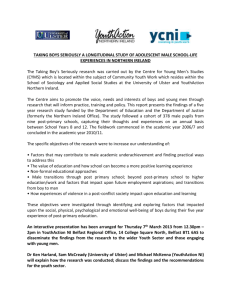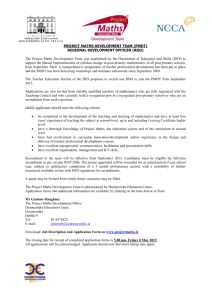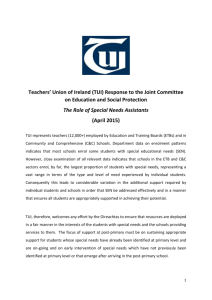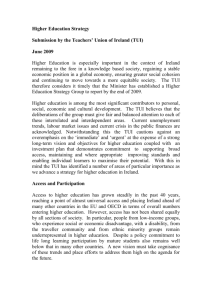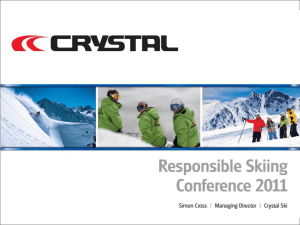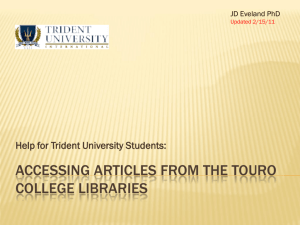Transition to Third Level
advertisement
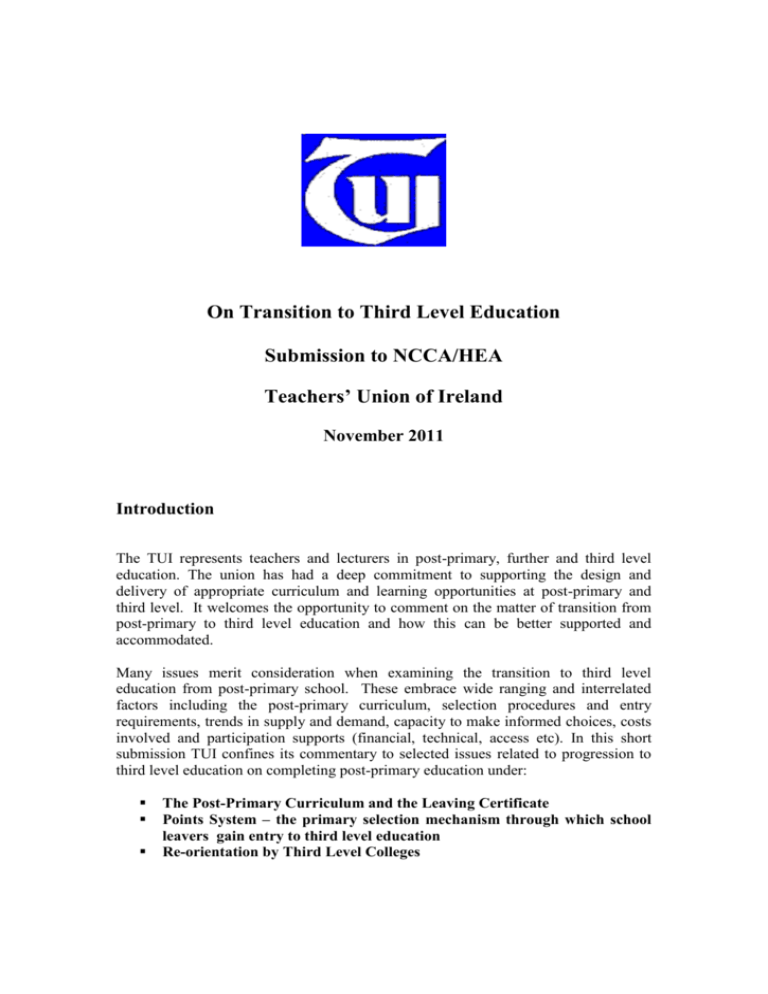
On Transition to Third Level Education Submission to NCCA/HEA Teachers’ Union of Ireland November 2011 Introduction The TUI represents teachers and lecturers in post-primary, further and third level education. The union has had a deep commitment to supporting the design and delivery of appropriate curriculum and learning opportunities at post-primary and third level. It welcomes the opportunity to comment on the matter of transition from post-primary to third level education and how this can be better supported and accommodated. Many issues merit consideration when examining the transition to third level education from post-primary school. These embrace wide ranging and interrelated factors including the post-primary curriculum, selection procedures and entry requirements, trends in supply and demand, capacity to make informed choices, costs involved and participation supports (financial, technical, access etc). In this short submission TUI confines its commentary to selected issues related to progression to third level education on completing post-primary education under: The Post-Primary Curriculum and the Leaving Certificate Points System – the primary selection mechanism through which school leavers gain entry to third level education Re-orientation by Third Level Colleges Post-Primary Curriculum and the Leaving Certificate A) The Purpose of Post-Primary Education It is most important to recognise from the outset that the essential purposes of the post-primary curriculum and the Leaving Certificate, as an instrument of assessment, are to: prepare young people for adult life and active citizenship foster personal and social development enable continued learning in a self-directed fashion throughout life and formally recognise and accredit the level of attainment at the conclusion of post-primary education. The use of the Leaving Certificate by the Central Applications Office (CAO) as a selection mechanism for entry to Higher Education is a by-product, albeit one of considerable significance. Furthermore, in excess of 40% of those who sit the Leaving Certificate do not proceed to higher education and their decision in this regard must be respected. For these students, the Leaving Certificate serves an immensely important and immediate purpose as a portal to labour market opportunities and participation in society and adult life. The curriculum and assessment processes must be shaped first and foremost to serve the needs of this cohort and must not be distorted to serve the needs of higher education. This notwithstanding, there is an evident need for greater congruence between the purposes and practices of the various levels of the public education system, in order to better meet the needs of learners. In this respect, institutional needs - perceived or real – must be subordinated to learner needs. In addition to the influence of the senior cycle curriculum and, possibly, the predictive value of subjects taken at Leaving Certificate, the capacity of young people to engage effectively with third level studies varies and is dependent on a wide range of complex factors, including socio-economic status, educational background of parents/family, level of prior educational attainment, aptitude and personal capacity, commitment and effort. Therefore, the complexity of transition to third level and how that can best be accommodated and supported must not be understated. B) Curriculum Issues With specific reference to curriculum at post-primary junior cycle and post-primary senior cycle, the TUI makes the following observations. i) Literacy, language and literary skills Basic skills There is much commentary and some anecdotal evidence to suggest that a growing number of students entering higher education exhibit serious deficiencies in basic literacy, the technical command of language (syntax, grammar) and higher order literary and analytical skill. This is seen as a significant impediment to successful completion of higher education courses. This problem has its roots in and must be robustly addressed at primary level, in the first instance, with coherent continuity of approach at second level. A more focused teaching of literacy and language (including grammar and syntax) at primary level is required as well as a whole-school approach at second level. Dedicated time and adequate resources are needed, as are explicit objectives in the syllabus documents of all subjects. Developing literacy and language skills should not be perceived as the domain of one or a few subjects. Modern languages There is long-standing concern about the relatively mediocre level of oral competence in modern languages. TUI suggests: - prioritisation of oral skills in all languages at junior cycle - resourcing of appropriate testing and certification of oral skills - adequate school facilities to promote the development of oral and aural skills - enhanced curricular provision to enable schools offer a wider choice of modern languages and support the formation of smaller class groups when focussing on developing oral and aural competence - the explicit prioritisation of spoken competence in Gaeilge and an attendant re-balancing of syllabi and teaching approaches. ii) Mathematical and science competence Deficiencies are also reported in the level of the mathematical and science competence of students entering third level courses. This is of particular importance when courses of study being pursued have a strong science or maths component. Mathematics Project Maths is designed to enhance mathematical understanding and will, it is hoped, address perceived deficiencies. Unavoidably, it will be some time before we see the real benefit of this initiative. Adequate resourcing (e.g. facilities, materials, staffing) will be required if the real potential of project maths is to be realised. This and other initiatives must strike a balance between meeting the need for mathematical literacy of those who do not proceed to higher education and nurturing the capacities of those who wish to pursue third level studies in maths and other subjects underpinned by mathematical concepts. It is hoped project maths will address current concerns in relation to student performance in maths. However, other measures may merit consideration at a future time when the impact of this initiative is better known and understood. For example, it may be useful to consider the development of a senior cycle maths programme, sufficient in depth and breadth for those who may not wish to pursue a career with a core or strong mathematical foundation. An additional, specialised course could be designed to address the needs of those who have a strong aptitude and orientation for mathematical studies. Similar to expanding provision for modern languages or promoting science education enhanced teacher allocations would be necessary. As with literacy and language, many of basic principles and formulae underpinning mathematical studies must be learned and memorised (as well as understood) and this foundation must be established early in the primary cycle and continued into postprimary. In this regard, the current practice of allowing calculators to be used by students up to and during the Junior Certificate Examination may be counterproductive. Science Issues regarding the uptake of science subjects, the assessment of science knowledge and overall outcomes are well documented. In relation to science in particular, TUI notes the major problem is not the second-level curriculum but the inadequacy of infrastructure and supports. Problems to be addressed include: the denial of access to science to some students at junior cycle lack of access to the full range of science subjects at senior cycle poor laboratory facilities that limit the capacity to do investigatory work the absence of technical support reliance on the terminal written exam the widespread perception of chemistry and physics as being more difficult than biology and, therefore, less likely to generate high points in the Leaving Certificate student self-selection out of chemistry and physics (although they may be more appropriate to their longer term life and career interests) and a resultant inadequate science foundation for certain third level studies the attenuation of sustainable employment opportunities for teachers of physics and chemistry teachers. The TUI advises that: science facilities be upgraded to a specified standard in all schools technical assistance be made available to support the broader use of practical/investigatory activity the employment of physics and chemistry teachers and the provision of chemistry and physics options be incentivised through an ex-quota allocation primary schools be enabled to enhance provision of science education. iii) Problem solving, critical thinking, analytical skills, personal skills (Core skills) A common refrain is that young people entering higher education or employment lack problem solving, analytical and interpretative skills and creativity. This refrain is not particular to Ireland - it is also to be heard across European and OECD countries. It is, of course, both prudent and valid to ask if the tasks set by employers, their styles of management, the content of higher education courses and the teaching approaches deployed act to suffocate and alienate the employees and students. However, insofar as there is a problem, it can be addressed in part by curricular initiatives across the curriculum. In this regard the TUI makes the following observations. Reforming the curriculum and embedding key skills The NCCA initiative on embedding key skills in the senior cycle has the potential to have strong positive effect but only if all schools are resourced to support it across the curriculum. To date, for want of adequate resourcing, ‘pilot’ projects have been limited in scope. It is regrettable that this and other aspects of senior cycle reform such as greater linkage across the various programmes, the development of short courses, the refinement of Transition Year - continue to be stymied by a lack of political will. The TUI believes it is imperative that such senior cycle reform is advanced in tandem with any reform of the junior cycle. Teaching approaches/methodologies It is widely accepted that the use of more active, experiential, investigatory approaches to teaching and learning promote engagement by students, deeper understanding of the subject area as well as the development of the key, transferable skills. TUI holds that essential to achieving the desired outcomes are: smaller class size and capacity to create small groups for some learning activities access to libraries, resource areas, laboratories, workshops and digital media, and improved access to a wider variety of teaching materials recalibration of the summative assessment system (state examinations) to reward knowledge and competence acquired through active teaching and learning approaches. Also important is a differentiated curriculum and teaching which has a major role to play in equipping sub-sets of the post-primary cohort to access higher education. However, unless schools are adequately resourced the above will not be possible and students will suffer. The autonomous learner Third level lecturers emphasise that the most valuable asset a student can have is the capacity to be a self-directed, motivated learner. The autonomous learner is one who can work independently, is self-reliant and can both direct her/his own learning and engage in structured collaboration with others. However, there is anecdotal evidence that many students do not have this capacity on entering higher education. This may be due, in part, to the increased and extended focus on ‘teaching to the test’ at second level which diminishes the time for wide and deep learning, critical analysis and creative and self-directed work. the spread of the grind industry with its focus on ‘maximising points’ and rote learning which puts further pressure on the mainstream sector/teacher to teach to the test. Both of these issues call for a revision of the points system which now exercises considerable influence on how achievement in the Leaving Certificate is viewed and experienced (see further comment on this below). Social, personal and health education (SPHE) The TUI notes that while a programme in SPHE is mandatory at junior cycle, it is not mandatory at senior cycle. As a result, it is seldom provided. It is nothing short of perverse that senior cycle students should be denied access to a programme that promotes personal wellbeing and development at precisely the age and life-stage when it would be of great value to them. In terms of personal and social preparation for transition to higher education it would also confer strong benefit, but only if adequately resourced. iv) Special educational needs and other discrete educational needs It is of significant concern that, so far, the government has legislated for, but has failed to provide sufficient resources to facilitate, the integration of students with special educational needs into mainstream education. Full commencement and implementation of the EPSEN Act has been deferred, sine die. Teachers report a lack of capacity in the system at a number of levels – inadequate teacher allocations; poor or delayed access to assessment and psychological services; lack of suitable teaching materials and learning tools and insufficient teacher professional development across all subjects. These resource deficits limit the capacity of students with special educational needs to access the post-primary curriculum fully and have the consequence of damaging their chances of progressing to higher education. Resource deficits similarly affect students for whom English is not the first language. Re-orientation at Third Level Responsibility for supporting effective transition to higher education must be shared across the various levels of education and resourced accordingly. To this end, the TUI believes that the following merit particular consideration as actions that could be undertaken at third level. A) Induction and Foundation Programmes Third level colleges currently provide some induction programmes to support the transition to higher education, but to a limited number of students and in a limited number of contexts. A broader range of such programmes should be available to all students throughout the first year in college and should address areas such as language skills, study skills, research skills and ICT skills. In addition, foundation modules in specific subject areas (e.g. science subjects, maths, and a language) should be provided for students who may need particular support in making the transition to third level studies. In tandem, tutorial style support should be strengthened and expanded, especially in the first year at college, providing greater opportunities for networking in small, more supportive groups and promoting easier access to academic staff and their advice or support. B) Provision of General Initial Courses leading to Specialism There is a growing tendency for students to enrol in highly specialised courses upon entry to third level. Often this requires intense engagement with highly specialised material or subject matter in the first year of study, for which some may not be adequately prepared. Provision of broad-based programmes in the first year and, therefore, delaying specialisation until the second year may have merit in some instances, especially for courses of three or more years duration. Such an approach would facilitate a longer ‘transition period’, in which the student could become familiar with the demands of third level and also explore what subject specialism would best fit their interests and aptitudes. TUI accepts the fact that this approach may not be feasible possible where courses are of shorter duration (less than three years) and geared to very specific labour market skills. In such instances it urges that the induction and tutorial support be strengthened considerably as very often the students who take courses of shorter duration are those who need most support (see below). C) Appropriate Supports to Facilitate Completion In addition to students who enter higher education under access programmes, a significant number of entrants to third level colleges, particularly to the Institutes of Technology, initially undertake courses at Levels 6 and 7 on the National Qualifications Framework. Many of these students, in addition to induction support and foundation programmes, may require considerable and sometimes customised support to enable them to complete. Higher education institutions need to be resourced adequately to provide and continue these supports. The absence of such supports will simply guarantee on-going and unnecessary attrition rates. D) Teaching and Learning TUI notes that, in most cases, teachers in primary, post-primary and further education settings are (or will be from 2013) required to have a formal qualification in education, which includes foundation and professional studies and teaching practice experience. It accepts that a requirement for a similar formal qualification may not be appropriate for third level settings. However, it believes that the development of pedagogical skills and teaching and learning strategies among third level lectures is important and urges investment in this. Such an approach could assist lectures in enhancing the first year experience thus better supporting students during the initial and sometimes turbulent transition stage. It could also address some of the longer term engagement issues that present for students throughout their college life, thereby reducing attrition and non-completion and improving student performance. E) Progression Pathways A major objective of public policy is that a culture of life-long learning be fostered and facilitated. Central to this is the clear identification of and proactive promotion of multiple progression paths into and within higher education. However, Ireland continues to rely heavily on direct progression to third level from post-primary education to populate colleges and universities. To date, insufficient progress has been made in relation to mapping and formalising alternative routes. In particular, TUI believes the recognition of prior learning including experiential learning and routes from post-primary and the workplace, through further education to higher education need to be further developed. The Points System The points systems and associated dilemmas commanded little public debate in the past number of years. As a selection mechanism for higher education, a points system is arguably fit for purpose and has, at least, the appearance of fairness, transparency and consistency. However, the current points system, the external selection mechanism for entry to third level, now exercises a significant and distorting influence on how the post-primary curriculum is experienced. A focus on points, as opposed to student aptitude or preference, too often determines subject choice and constrains teaching and learning. Many policy makers and political leaders have been were muted on this issue, leaning on the recommendation of the Points Commission (over eleven years ago) that the points system should be retained as it is the ‘fairest’, most equitable and transparent method of selection for third level. This delayed open and frank dialogue on the escalating negative affects on the teaching and learning environment and the formation of young people. It deflected conversation away a very unhelpful outcome of the current system - the crude allocation of people into occupational slots and career trajectories that in a many cases were unsuitable and not in keeping with natural aptitude and interest. Furthermore, it prevented on-going examination of a system that supported, albeit unintentionally, the emergence of manipulative practices in the alignment of points to particular courses in particular colleges, making access to some courses unduly and unnecessarily competitive. Finally, but not least, it rendered inconspicuous how blind and indifferent a points system can be to the corrosive effects of socio-economic and inter-generational educational disadvantage on the attainment levels at Leaving Certificate of a significant minority of the second-level cohort – students who do not even get to the start-line in the “points race”, so-called. Therefore, recent focussed attention by the Minister for Education and Skills and other key commentators and a general openness to exploring the desirability of and possibilities for change is welcome. TUI believes a rethink of the points system is not just desirable, but somewhat overdue and deserving of immediate action. It supports further exploration of many of the ideas set out at the NCCA/HEA in September but advises that additional public consultation and discrete discussions with key stakeholders (parents, students, trade unions, educational management bodies, business interests and community and voluntary sector) is essential before any concrete changes are implemented. TUI favours a number of ideas and, in particular, suggests: Weighted points in Leaving Certificate subjects related to the discipline to be studied in third level, this weighting to be applied by the Higher Education Institute in accordance with a national protocol Reduced number of bands within each grade at Leaving Certificate (referred to as reducing granularity of points .by some), combined with random selection in some instances Threshold entry requirements for each undergraduate area (set by HEI in accordance with a national protocol), combined with supplementary testing and/or random selection and expansion of supplementary routes in some instances. Conclusion TUI emphasises that it is not primarily the post-primary curriculum objectives and content that are at issue in terms of any perceived lack of preparedness for third level studies. A far more significant issue is the lack of congruence between curriculum objectives and the assessment processes at post-primary level and the lack of structured coherence and continuity at the various transition points in public education provision. In order to achieve the necessary structural coherence and to optimise the benefit of the curriculum at post-primary and third level to students, we need, more than ever before, the political will to invest in high quality public education provision underpinned by adequate public consultation and discrete discussions with key stakeholders. Ends. For clarification on any of the above points please contact: Bernie Judge, Education and Research Officer, Email: bjudge @tui.ie Phone: 01 4922588.
